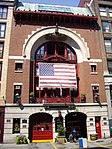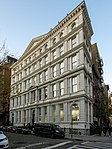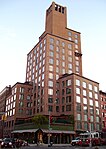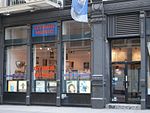Great Jones Street

Great Jones Street is a street in New York City's NoHo district in Manhattan, essentially another name for 3rd Street between Broadway and the Bowery. The street was named for Samuel Jones, a lawyer who became known as "The Father of The New York Bar" due to his work on revising New York State's statutes in 1789 along with Richard Varick, who had a street in SoHo named after him. Jones was a member of the New York State Assembly from 1796 to 1799, and he also served as the state's first Comptroller.Jones deeded the site of the street to the city with the stipulation that any street that ran through the property had to be named for him. However, when the street was first created in 1789, the city already had a Jones Street in Greenwich Village, named for Dr. Gardner Jones, Samuel Jones's brother-in-law. The confusion between two streets with the same name was broken when Samuel Jones suggested that his street be called Great Jones Street. An alternative theory suggests that the street was called "Great" because it was the wider of the two Jones Streets.
Excerpt from the Wikipedia article Great Jones Street (License: CC BY-SA 3.0, Authors, Images).Great Jones Street
Great Jones Street, New York Manhattan
Geographical coordinates (GPS) Address Nearby Places Show on map
Geographical coordinates (GPS)
| Latitude | Longitude |
|---|---|
| N 40.72686 ° | E -73.992759 ° |
Address
Great Jones Street 40
10012 New York, Manhattan
New York, United States
Open on Google Maps





